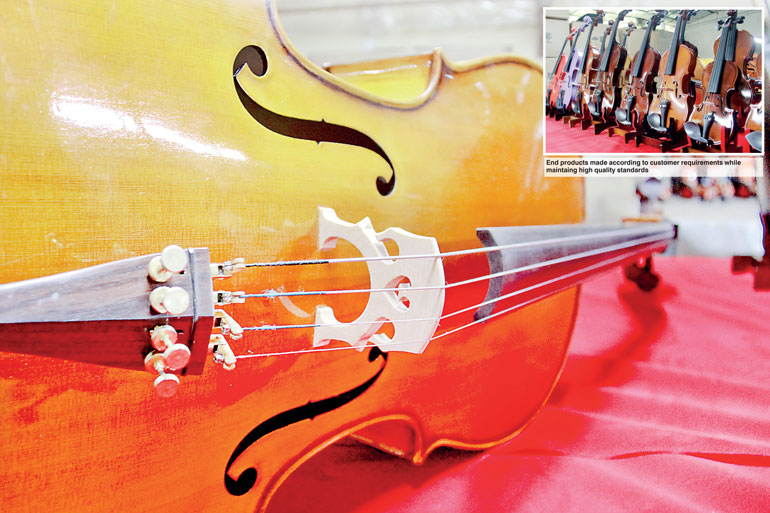Sunday Feb 15, 2026
Sunday Feb 15, 2026
Saturday, 10 October 2015 00:03 - - {{hitsCtrl.values.hits}}

 In the city of Gampaha lies a factory in which special handmade musical instruments are made, including violins, cellos and double bass. These instruments are mainly crafted for the Western market. However, what once used be a profitable business has turned on its head with the entry of Chinese goods into the foreign market and factory has not been able to export even a single violin in recent times, with people like Palitha Ganegoda and his workers paying the price.
In the city of Gampaha lies a factory in which special handmade musical instruments are made, including violins, cellos and double bass. These instruments are mainly crafted for the Western market. However, what once used be a profitable business has turned on its head with the entry of Chinese goods into the foreign market and factory has not been able to export even a single violin in recent times, with people like Palitha Ganegoda and his workers paying the price.
Started in 1996 as a musical instrument manufacturing company mainly focusing on hand-made violins, it took years for Ganegoda to start exporting violins as foreign clients were anxious about getting handmade instruments from Sri Lanka. After attending the National Association of Music Merchants (NAMM) and sending out samples, Ganegoda was finally able to get orders for violins.
Though the start was slow, business picked up very well and the number of workers gradually rose from 40 to 140. During 1997 and 2004, when business was at its peak, Ganegoda was able to export close to 2,000 instruments a month, which comprised over 1,500 violins, 200 cellos and five to 10 double bass.
The workers were trained by highly-skilled German and Czechoslovakian technicians as making these instruments is a highly-specialised task. Since 2004 however, things started looking shaky for the company when Chinese products started taking over the market and as a result overtime the workforce dropped. Currently there are only 15 workers who have managed to hang on to their jobs despite falling sales. The company has completely stopped exporting since competing with the Chinese is impossible, with the latter being willing to sell three violins for the price at which Ganegoda offers one.
Violins are made only using high quality wood such as maple and spruce imported from Germany. This is used to make the body (neck, back and sides) of the instrument while ebony is imported from India for the pegs and tail parts of the instrument.
The process of making these instruments is highly-specialised and each process is carefully examined to get the high quality end product according to internationally-accepted standards, known as Stradivarius measurements.
The wood is first pressed against a master mound to get the shape and size of the instrument being made. Then the wood is carefully polished until the desired thickness is obtained. In a violin, there can be eight different thicknesses and as the instrument is being polished a measurement has to be taken from time to time to ensure that the desired thickness is maintained. Then the instruments are coloured according to the user needs and finally hand-varnished.
A hand-made violin can be sold for about Rs. 75,000 to Rs. 150,000 in the local market and up to$ 2,000 in the foreign market. A hand-made violin can take up to a month in the making process.
Now violins are only made for the local market and sold at roughly Rs. 9,000 and above. Ganegoda has foreign orders from time to time from clients who require high quality products but not enough to turn the business around in a meaningful manner.
With the decline of sales overtime and no signs of a promising future, Ganegoda and his workers are now hoping for a miracle to sustain the livelihood of the highly-skilled workers and their families.